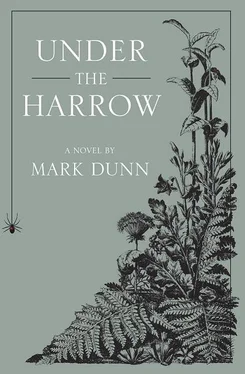“And will report back to you on the morrow,” she called to me as we parted. I nodded and waved, and then turned my hand to hail a hackney coach and with minimal negociation arrived upon a fair price to hasten me to the outlying village of Fingerpost.
In less than fifteen minutes I was seated upon my brother and sisterin-law’s sofa and listening to the disturbing details of my nephew’s disappearance, those details pushing aside, at least for the nonce, all thoughts of the unfortunate and dying Mrs. Pyegrave.
— NOTES—
THE SUPPOSITIVE POSTULATIONS, three passionately held views on why Dingley Dell has been quarantined from the rest of the world. All attempts to reconcile these positions or to bring one theory to ascendance above the others have been for naught. The sole source of outside information which should have proven most efficacious in determining which of the three postulations to be the correct one has been the historic contact afforded Dinglian brokers of trade and their Outlander counterparts through the fortnightly transactions that take place at the Summit of Exchange upon the Northern Ridge. Over the many decades, which span the long epoch of Summit trade, Dinglian brokers have reported absolute, near monastic silence from the Outlanders except when intercourse requires communication of a strictly transactional and commercial nature. Ned Crupp addresses this curious consistency in his 1990 memoir The Honest Broker: Sixty-five Years upon the Summit :
“These men wore cloaks and cowls, and everything about them was shrouded in mystery. They confined their speech without exception to the business of our business dealings with them. Dingley Dell bartered her crops and the articles of jewellry and furniture she made (and which she fashioned and turned extraordinarily well) for those goods that she could not grow or build herself, and all was bliss, except when it wasn’t, which was every moment in which we were given to wonder about our whereabouts and if we were destined to spend the remainder of eternity here in this rusticated valley without any useful and current knowledge of the world that lay beyond our border. And this is why, dear reader, not being able to help myself, I asked them upon the eve of my retirement that question which has become the most posited within the Dell: “Which of the three Suppositive Postulations is the correct one?” To which they responded (as I always suspected that they would) with a negatory shake of the head and a concerted return to the business at hand. For this is how rigorously they had been trained, that there should be no departure whatsoever from the automatonic response, no matter how much I wished it to be so.”
The Suppositive Postulations are as follows:
1.) That life abroad is a life not to be desired, and the Outlander tradesmen are forbidden to speak of the tribulations of their battered world lest they do injury to our tender ears and delicate hearts. And its corollary: that the last physiologically and psychologically pure and unadulterated strain of humanity remains the denizens of Dingley Dell. Their existence is preserved as living reminder of the anteapocalyptic era in the continuum of the human survival on the planet.
2.) That the plague which overspread the globe in the year 1890, yet spared the Dell in its geographically-segregated isolation, continued to ravage the world over the course of the succeeding years, and although it was eventually vanquished, suffered only a few hardy souls to survive and fructify. Subsistence resources in the Terra Incognita being scarce, it has traditionally been thought best for Dinglians to remain segregated, and for commercial interchange to be closely regulated for the husbanding benefit of both transacting parties.
3.) That a good many Outlanders did live to prosper beyond the bounds of Dingley Dell, but the valley’s citizens, in much the same way as farmers who have not been vaccinated against the pox, would submit themselves to certain death should they venture abroad without previous exposure to the earlier pandemic. It is premised that this is the reason that so many who ventured from the Dell did not return, and that those who did come back did so in a grievous lunatic state, bearing evidence of some deleterious agent to which Dinglians are susceptible — an agent which implants a savage and vicious affliction upon the brain.
It is the last of the three postulations which claims the greatest number of advocates, and which explains the decision by most of the denizens of Dingley Dell to remain safely within its confines until such time as, perhaps, a vaccine could be devised that would permit them a disease-free reunion with their human cousins in the Terra Incognita. Venturing precipitously without preventive inoculation, so goes the thinking, would be tantamount to playing cards with fate, their collective hand lacking in trumps.
EARLY HISTORY OF DINGLEY DELL.
An Historical Millennial Essay by Daniel Gamp, Esq.
There are a great many things in the early years of this third millennium of our Christian age that we do not know in addition to the overarching enigma of our geographical location. But there is much that we do : the product of over 110 years of meticulous documentation of life within the Dell. We know, for example, that an orphanage was established in the year of our Lord 1882 in the village of Hungerford, into which parentless children from points throughout the world were placed, to be nutured and raised in the spirit of Christian beneficence. It was there in the Magnanimity House Orphanage that each youthful inmate of a certain educable age was taught a practical trade, and it was there on the morning of April 2, 1890, that this society of children — the first generation of Dingley Dell— woke to make a most astounding discovery — a discovery that would dramatically alter their lives and the lives of their descendents from that critical moment forward.
All the adults had disappeared.
Every man and woman, most of whom had served as teachers of skilled trades to the young orphans, had vanished without a trace into the dark night, leaving behind a short note that would have to suffice for explanation:
To the Children of Dingley Dell:
With terrible fear and wretched sadness we have learnt that a great plague has fallen upon the world. Its blanket of death has overspread every known place on this vast orb with the solitary exception of our isolated valley. It is with equal fear and sadness that we must tell you of that which we have learnt in addition: one of your own teachers has been taken by the pandemic, and has, moreover, exposed each of the other adult members of the community to this most horrible disease.
We have therefore concluded as a group that there is nothing else that can be done but that we should remove ourselves permanently from your society, and pray that the infection has not had time to spread to you as well.
So we hereby bid you adieu and leave you to your own good devices. We trust that we have trained the older amongst you well, and that you will thrive and grow and make of Dingley Dell everything that it has been our hope to attend and commend.
Do not venture from this cordoned valley or death will most assuredly take you. Remain here and God grant that you may abide in health and prosperity.
With undying affection,
Your teachers
(the names of each appearing in alphabetical order with the occasional appended personal note of encouragement and fond regard)
And so it came to pass that on the second day of April in the year of our Lord 1890, two-hundred, seven-and-fifty children ranging in age from three-years-and-three-months to fifteen-years-and-five-months found themselves left to their own devices. Though their juvenile apprenticeships gave them the skills necessary to build a community based upon the twin foundations of resilience and self-reliance, and though they would take good care of themselves in this valley that had yet to be given the name Dingley Dell, it would still be no easy thing for these young waifs to live without loving adult companionship, and there was the shedding of copious tears born of that painful abandonment (mixed with the tears of relief that the plague did not derange — in the end — the health of even a single child within the Dell). Although none of the Dinglian orphans had ever known the purest form of love — that which exists between parent and child — yet the tender care offered to them by their teachers had been sufficiently sustaining, and would be sorely missed and mourned.
Читать дальше












